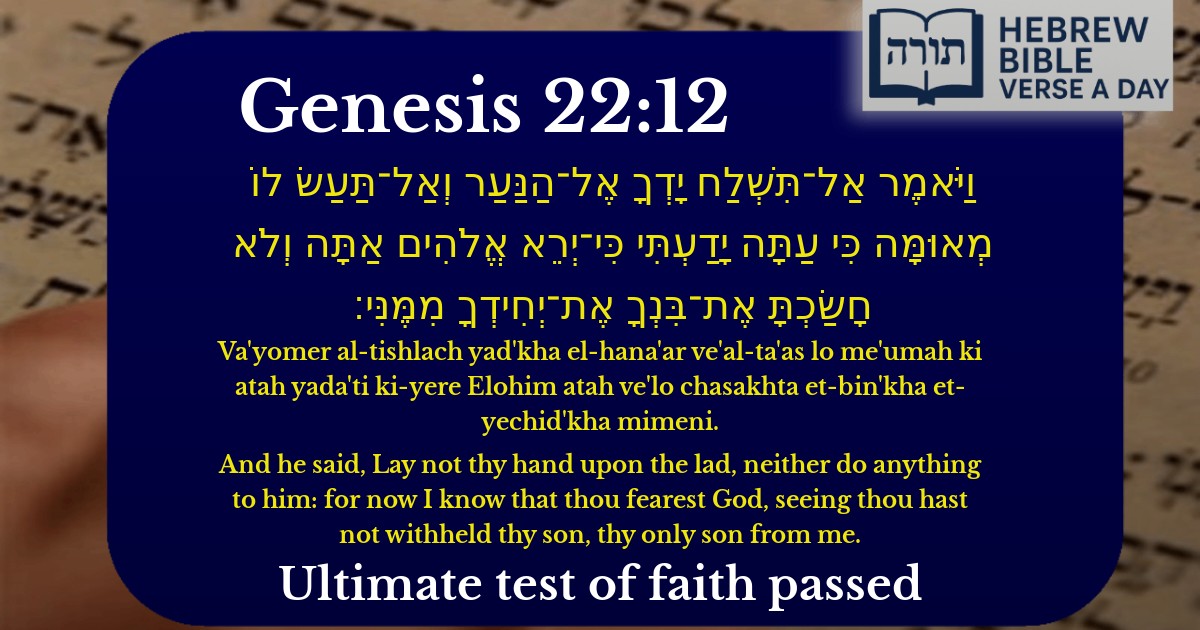Join Our Newsletter To Be Informed When New Videos Are Posted
Join the thousands of fellow Studends who rely on our videos to learn how to read the bible in Hebrew for free!
Hebrew Text
וַיֹּאמֶר אַל־תִּשְׁלַח יָדְךָ אֶל־הַנַּעַר וְאַל־תַּעַשׂ לוֹ מְאוּמָּה כִּי עַתָּה יָדַעְתִּי כִּי־יְרֵא אֱלֹהִים אַתָּה וְלֹא חָשַׂכְתָּ אֶת־בִּנְךָ אֶת־יְחִידְךָ מִמֶּנִּי׃
English Translation
And he said, Lay not thy hand upon the lad, neither do anything to him: for now I know that thou fearest God, seeing thou hast not withheld thy son, thy only son from me.
Transliteration
Va'yomer al-tishlach yad'kha el-hana'ar ve'al-ta'as lo me'umah ki atah yada'ti ki-yere Elohim atah ve'lo chasakhta et-bin'kha et-yechid'kha mimeni.
Hebrew Leining Text
וַיֹּ֗אמֶר אַל־תִּשְׁלַ֤ח יָֽדְךָ֙ אֶל־הַנַּ֔עַר וְאַל־תַּ֥עַשׂ ל֖וֹ מְא֑וּמָה כִּ֣י <b>׀</b> עַתָּ֣ה יָדַ֗עְתִּי כִּֽי־יְרֵ֤א אֱלֹהִים֙ אַ֔תָּה וְלֹ֥א חָשַׂ֛כְתָּ אֶת־בִּנְךָ֥ אֶת־יְחִידְךָ֖ מִמֶּֽנִּי׃
וַיֹּ֗אמֶר אַל־תִּשְׁלַ֤ח יָֽדְךָ֙ אֶל־הַנַּ֔עַר וְאַל־תַּ֥עַשׂ ל֖וֹ מְא֑וּמָה כִּ֣י ׀ עַתָּ֣ה יָדַ֗עְתִּי כִּֽי־יְרֵ֤א אֱלֹהִים֙ אַ֔תָּה וְלֹ֥א חָשַׂ֛כְתָּ אֶת־בִּנְךָ֥ אֶת־יְחִידְךָ֖ מִמֶּֽנִּי׃
🎵 Listen to leining
Parasha Commentary
📚 Talmud Citations
This verse is quoted in the Talmud.
📖 Ta'anit 4a
The verse is referenced in the context of discussing the merit of Abraham's willingness to sacrifice Isaac and how it serves as a source of divine mercy for his descendants.
📖 Sanhedrin 89b
The verse is cited in the discussion of the binding of Isaac (Akedah) and its implications for understanding the nature of prophetic tests and divine commands.
📖 Berakhot 62b
The verse is mentioned in relation to the theme of divine tests and the reward for passing them, illustrating Abraham's faith and obedience.


The Divine Command and Its Reversal
The verse (Bereishit 22:12) records the moment when the angel of Hashem stops Avraham from sacrificing Yitzchak. Rashi explains that the phrase "אַל־תִּשְׁלַח יָדְךָ אֶל־הַנַּעַר" ("Do not stretch out your hand against the lad") demonstrates that Avraham had already lifted the knife with full intent to fulfill the divine command, proving his complete devotion to Hashem. The Rambam (Moreh Nevuchim 3:24) emphasizes that this test was never about the actual sacrifice, but about Avraham's willingness to obey Hashem's will without hesitation.
The Meaning of "Now I Know"
The phrase "כִּי עַתָּה יָדַעְתִּי" ("for now I know") raises a theological question: Does Hashem "learn" something new? The Midrash (Bereishit Rabbah 56:7) resolves this by explaining that Avraham's actions revealed his fear of G-d to the world, not to Hashem. The Sforno adds that this public demonstration of faith would inspire future generations in their service of Hashem.
The Significance of "Your Only Son"
The repetition of "אֶת־בִּנְךָ אֶת־יְחִידְךָ" ("your son, your only one") echoes Hashem's original command (22:2). The Kli Yakar notes that this emphasizes:
The Nature of the Test
The Talmud (Sanhedrin 89b) discusses how this was one of ten tests Avraham faced. Rabbeinu Bachya explains that the Akeida served multiple purposes:
Fear of G-d in Action
The conclusion "כִּי־יְרֵא אֱלֹהִים אַתָּה" ("that you are G-d-fearing") defines true yirat Shamayim. The Ramban explains this means Avraham's fear was not merely emotional, but expressed through concrete action - his willingness to sacrifice what was most precious to him when commanded by Hashem. This became the paradigm for Jewish devotion throughout history.